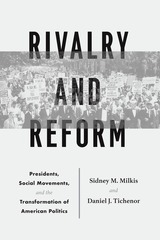
In this volume of original essays, a distinguished group of scholars and activists reassess the mixed legacy of this third major reform period of the last century. They examine not only the policies and programs that were part of LBJ's Great Society, but also the underlying ideological and political shifts that changed the nature of liberalism. Some of the essays focus on Lyndon Johnson himself and the institution of the modern presidency, others on specific reform measures, and still others on the impact of these initiatives in the decades that followed. Perspectives, methodologies, and conclusions differ, yet all of the contributors agree that the Great Society represented an important chapter in the story of the American republic and its ongoing struggle to reconcile the power of the state with the rights of individuals—a struggle that has continued into the twenty-first century.
In addition to the editors, contributors include Henry J. Abraham, Brian Balogh, Rosalyn Baxandall, Edward Berkowitz, Eileen Boris, Richard A. Cloward, Hugh Davis Graham, Hugh Heclo, Frederick Hess, William E. Leuchtenburg, Nelson Lichtenstein, Patrick McGuinn, Wilson Carey McWilliams, R. Shep Melnick, Frances Fox Piven, and David M. Shribman.

Rivalry and Reform explores the relationship between presidents and social movements throughout history and into the present day, revealing the patterns that emerge from the epic battles and uneasy partnerships that have profoundly shaped reform. Through a series of case studies, including Abraham Lincoln and abolitionism, Lyndon Johnson and the civil rights movement, and Ronald Reagan and the religious right, Sidney M. Milkis and Daniel J. Tichenor argue persuasively that major political change usually reflects neither a top-down nor bottom-up strategy but a crucial interplay between the two. Savvy leaders, the authors show, use social movements to support their policy goals. At the same time, the most successful social movements target the president as either a source of powerful support or the center of opposition. The book concludes with a consideration of Barack Obama’s approach to contemporary social movements such as Black Lives Matter, United We Dream, and Marriage Equality.

During the past decade, Democrats and Republicans each have received about fifty percent of the votes and controlled about half of the government, but this has not resulted in policy deadlock. Despite highly partisan political posturing, the policy regime has been largely moderate. Incremental, yet substantial, policy innovations such as welfare reform; deficit reduction; the North American Free Trade Agreement; and the deregulation of telecommunications, banking, and agriculture have been accompanied by such continuities as Social Security and Medicare, the maintenance of earlier immigration reforms, and the persistence of many rights-based policies, including federal affirmative action.
In Seeking the Center, twenty-one contributors analyze policy outcomes in light of the frequent alternation in power among evenly divided parties. They show how the triumph of policy moderation and the defeat of more ambitious efforts, such as health care reform, can be explained by mutually supporting economic, intellectual, and political forces. Demonstrating that the determinants of public policy become clear by probing specific issues, rather than in abstract theorizing, they restore the politics of policymaking to the forefront of the political science agenda.
A successor to Martin A. Levin and Marc K. Landy’s influential The New Politics of Public Policy (Johns Hopkins University Press, 1995), this book will be vital reading for advanced undergraduate and graduate students in political science and public policy, as well as a resource for scholars in both fields.
READERS
Browse our collection.
PUBLISHERS
See BiblioVault's publisher services.
STUDENT SERVICES
Files for college accessibility offices.
UChicago Accessibility Resources
home | accessibility | search | about | contact us
BiblioVault ® 2001 - 2024
The University of Chicago Press









